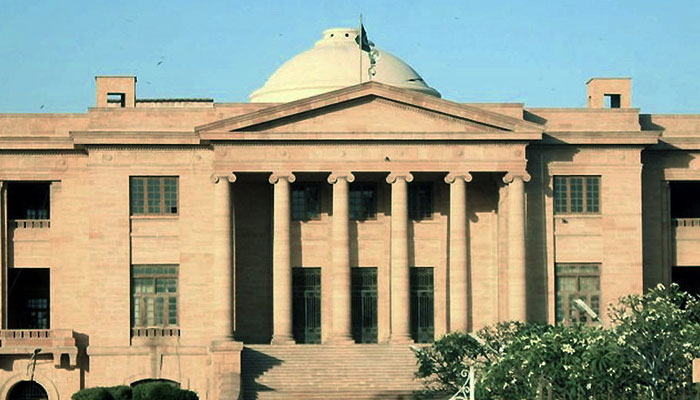SHC sets aside death penalty in sectarian killing case
The Sindh High Court on Monday set aside the death sentence of a banned sectarian outfit’s member in a sectarian killing case.
Syed Mehroz Mehdi Rizvi was sentenced to death by an anti-terrorism court for murdering a Jamiat Ulema-e-Islam-Samiul Haq leader and two others in the Bahadurabad area on January 14, 2014. According to the prosecution, the appellant along with the absconding co-accused killed Mufti Usmanyar Khan, also the deputy administrator of a seminary in Gulistan-e-Jauhar, along with his two associates Mohammad Ali and Mohammad Rafiq on Sharea Faisal within the limits of the Bahadurabad police station.
Appellant’s counsel Mohammad Farooq contended that Rizvi was convicted by the trial court in a case of no evidence as he was not named in the FIR. He submitted that no incriminating evidence was recovered from the appellant that connected him with the offence and the prosecution failed to produce its star witness, who was the only eyewitness of the incident, before the trial court.
The counsel informed the SHC that the confessional statement of Rizvi should not have been relied upon by the trial court as it was neither true nor voluntary and he later retracted it before the trial court. The high court was requested to acquit the appellant by extending him the benefit of the doubt.
An additional prosecutor general said the appellant had recorded his confessional statement before a judicial magistrate in which he admitted that he along with his companions committed the murders and all the witnesses supported the case of the prosecution. He submitted that the prosecution had proved its case beyond any reasonable shadow of doubt and the appellant was rightly convicted by the trial court, due to which his appeal should be dismissed.
A division bench of the SHC headed by Justice Mohammad Karim Khan Agha after hearing the arguments and perusal of the evidence of the case observed that the prosecution had failed to establish the charge against the appellant beyond reasonable doubt. The high court observed that neither was the appellant’s name mentioned in the FIR nor were his features mentioned.
The SHC observed that the sole eyewitness of the prosecution was an injured of the incident who actually saw the assailants committing the murders and causing him injuries but the said witness did not appear before the trial court for recording his evidence and as such there was no eyewitness to the murders as per the prosecution evidence. The high court observed that the confessional statement of the appellant was neither voluntary nor truthful.
The bench observed that it was a well-settled principal of law that a retracted judicial confession cannot alone form the basis for convicting an accused in the case of capital punishment without independent corroborative evidence.
The SHC observed that the weapon used in the crime was not recovered from anyone and admittedly there was no eyewitness to the incident and also there appeared to be no circumstantial evidence linking the appellant to the murder.
The high court observed that the prosecution had failed to prove its case against the appellant and set aside the death sentence awarded to him by the trial court extending him the benefit of the doubt. The SHC ordered release of the appellant if not required in other cases.
-
 Shamed Andrew Wants ‘grand Coffin’ Despite Tainting Nation
Shamed Andrew Wants ‘grand Coffin’ Despite Tainting Nation -
 Keke Palmer Reveals How Motherhood Prepared Her For 'The Burbs' Role
Keke Palmer Reveals How Motherhood Prepared Her For 'The Burbs' Role -
 King Charles Charms Crowds During Lancashire Tour
King Charles Charms Crowds During Lancashire Tour -
 ‘Disgraced’ Andrew Still Has Power To Shake King Charles’ Reign: Expert
‘Disgraced’ Andrew Still Has Power To Shake King Charles’ Reign: Expert -
 Why Prince William Ground Breaking Saudi Tour Is Important
Why Prince William Ground Breaking Saudi Tour Is Important -
 AOC Blasts Jake Paul Over Bad Bunny Slight: 'He Makes You Look Small'
AOC Blasts Jake Paul Over Bad Bunny Slight: 'He Makes You Look Small' -
 At Least 53 Dead After Migrant Boat Capsizes Off Libya
At Least 53 Dead After Migrant Boat Capsizes Off Libya -
 'God Of War' Announces Casting Major Key Role In Prime Video Show
'God Of War' Announces Casting Major Key Role In Prime Video Show -
 Real Reason Prince William, Kate Broke Silence On Andrew Scandal Revealed
Real Reason Prince William, Kate Broke Silence On Andrew Scandal Revealed -
 Drew Barrymore Responds To 'Charlie's Angels' Costar's Comments About Her
Drew Barrymore Responds To 'Charlie's Angels' Costar's Comments About Her -
 Shakira Slips Hard On Stage During Life Show
Shakira Slips Hard On Stage During Life Show -
 King Charles Speaks Out Over Andrew's Scandal: 'Stand Ready To Help Police'
King Charles Speaks Out Over Andrew's Scandal: 'Stand Ready To Help Police' -
 Dax Shepard Recalls Horrifying Accident That Almost Killed Him
Dax Shepard Recalls Horrifying Accident That Almost Killed Him -
 Logan Paul's Bodyguard Hits Fan On Super Bowl Day
Logan Paul's Bodyguard Hits Fan On Super Bowl Day -
 Epstein Files: Anne Hathaway Mentioned As Highly Desired Guest For Bill Gates?
Epstein Files: Anne Hathaway Mentioned As Highly Desired Guest For Bill Gates? -
 Prince Harry Under A Lot Of Stress As Meghan Markle Makes Bizarre Demands
Prince Harry Under A Lot Of Stress As Meghan Markle Makes Bizarre Demands




